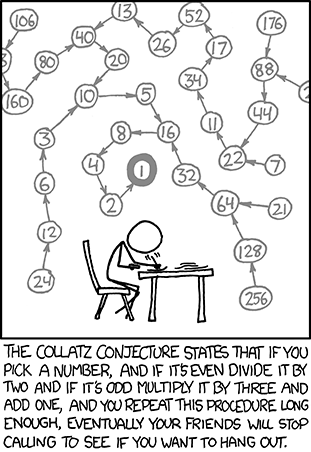1) The establishment of insatiable curiosity
When students are curious, they wonder ("I wonder if...", "I wonder why...", "I wonder how..."). When students wonder, they are formulating those problems that matter to them. When students formulate their own problems out of their curiosity, they are personally invested, greatly motivated, and will have a much more impressive recall of the work that they do. Students must enter secondary school with the confidence from primary school that they are allowed to be curious. They are allowed to be curious in school, they are allowed to be curious in every class, and they are allowed to be curious for their entire lives.
2) The fearlessness of failure
In my vision, when secondary students are all working on their own self-selected problems that matter to them, they aren't given much (if any) direction, and they don't have an adult frequently breathing over their shoulders to guide them. Students may get started on their problems, and then, surely, as students work on their problems, students will get "stuck", and then it's up to them to get themselves "un-stuck". (That's the nature of authentic problem-solving! Repeated trial and error.) Knowing what to do when you don't know what to do can sound like a tall order. But actually, primary students show us time and time again that, when they are driven by curiosity, they do know what to do: they keep trying! I'm picturing a toddler building a tower of toy blocks. They might try the exact same thing over and over and over a few times. And then they'll try something a little different. And then they'll try something a little different again. And again. And again. Until it works! But somewhere between toddler age and secondary school age, students "un-learn" to keep trying, un-learn that they are allowed to fail, and un-learn to try something a little different (to experiment). When they can't do these things, they are more likely to feel confined, to feel inadequate, to get frustrated, to give up, and to hate math (or whatever it is that they are working on). Students must enter secondary school with no fear of experimenting, failing, and trying again.
3) The clear articulation of their own ideas
This is another thing that I think young students usually do really well but then tragically "un-learn" by the time they get to secondary school. Kids generally love talking, and adults generally do well talking to them, getting them to talk and to explain their understanding of things. This shouldn't stop. As kids grow older, they need to keep talking, their brains need to keep being probed, and they need to keep being pushed to explain their ideas, communicating them to other people, both adults and peers. The better students can explain problems, the better they can process them, analyze them, and collaborate with others to solve them.
To conclude this post on primary mathematics education, it may be helpful to draw a parallel between mathematics and English. In secondary English language education, mastery is generally shown when you can understand & interpret any text and construct your own text that serves whatever purpose you will it to accomplish (e.g. to inform, to entertain, to persuade). The ultimate goal for students throughout English language education is the ability to communicate, to engage in the discourse of the world. But before students can achieve that goal, they must receive the basic building blocks of the language in primary school: the alphabet, phonics, spelling, grammar. I would say that the ultimate goal for students throughout mathematics education is to authentically and meaningfully engage with problems. But like English education, there are basic building blocks that need to be in place before that goal can be achieved. Without the "soft skill" core foundations of insatiable curiosity, fearlessness of failure, and clear articulation, students will never become the brilliant, innovative, effective problem-solving adults that are so desperately needed in this day and age.







